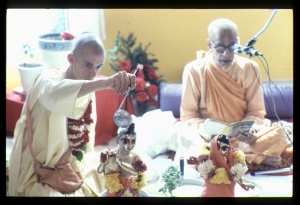CC Madhya 6.159: Difference between revisions
m (1 revision(s)) |
No edit summary |
||
| Line 1: | Line 1: | ||
{{ | [[Category:Sri Caitanya-caritamrta - Madhya-lila Chapter 06|C159]] | ||
<div style="float:left">'''[[Sri Caitanya-caritamrta|Śrī Caitanya-caritāmṛta]] - [[CC Madhya|Madhya-līlā]] - [[CC Madhya 6|Chapter 6: The Liberation of Sārvabhauma Bhaṭṭācārya]]'''</div> | |||
<div style="float:right">[[File:Go-previous.png|link=CC Madhya 6.158|Madhya-līlā 6.158]] '''[[CC Madhya 6.158|Madhya-līlā 6.158]] - [[CC Madhya 6.160|Madhya-līlā 6.160]]''' [[File:Go-next.png|link=CC Madhya 6.160|Madhya-līlā 6.160]]</div> | |||
{{CompareVersions|CC|Madhya 6.159|CC 1975|CC 1996}} | |||
{{RandomImage}} | |||
==== TEXT 159 ==== | ==== TEXT 159 ==== | ||
<div | <div class="verse"> | ||
ānandāṁśe ‘hlādinī,’ sad-aṁśe ‘sandhinī’ | :ānandāṁśe ‘hlādinī,’ sad-aṁśe ‘sandhinī’ | ||
cid-aṁśe ‘samvit’, yāre jñāna kari māni | :cid-aṁśe ‘samvit’, yāre jñāna kari māni | ||
</div> | </div> | ||
| Line 12: | Line 16: | ||
==== SYNONYMS ==== | ==== SYNONYMS ==== | ||
<div | <div class="synonyms"> | ||
ānanda- | ''ānanda-aṁśe''—in the part of bliss; ''hlādinī''—the pleasure potency; ''sat-aṁśe''—in the part of eternity; ''sandhinī''—the ''sandhinī'' potency; ''cit-aṁśe''—in the part of knowledge; ''samvit''—the ''samvit'' potency; ''yāre''—which; ''jñāna''—as knowledge; ''kari māni''—we accept. | ||
</div> | </div> | ||
| Line 19: | Line 23: | ||
==== TRANSLATION ==== | ==== TRANSLATION ==== | ||
<div | <div class="translation"> | ||
“The three portions of the spiritual potency are called hlādinī [the bliss portion], sandhinī [the eternity portion] and samvit [the knowledge portion]. We accept knowledge of these as full knowledge of the Supreme Personality of Godhead. | “The three portions of the spiritual potency are called hlādinī [the bliss portion], sandhinī [the eternity portion] and samvit [the knowledge portion]. We accept knowledge of these as full knowledge of the Supreme Personality of Godhead. | ||
</div> | </div> | ||
| Line 26: | Line 30: | ||
==== PURPORT ==== | ==== PURPORT ==== | ||
<div | <div class="purport"> | ||
To acquire knowledge of the Supreme Personality of Godhead, one must take shelter of the samvit potency of the Supreme Lord. | To acquire knowledge of the Supreme Personality of Godhead, one must take shelter of the ''samvit'' potency of the Supreme Lord. | ||
</div> | </div> | ||
__NOTOC__ | |||
<div style="float:right; clear:both;">[[File:Go-previous.png|link=CC Madhya 6.158|Madhya-līlā 6.158]] '''[[CC Madhya 6.158|Madhya-līlā 6.158]] - [[CC Madhya 6.160|Madhya-līlā 6.160]]''' [[File:Go-next.png|link=CC Madhya 6.160|Madhya-līlā 6.160]]</div> | |||
__NOTOC__ | |||
__NOEDITSECTION__ | |||
Revision as of 12:04, 29 July 2021

His Divine Grace
A.C. Bhaktivedanta Swami Prabhupada
A.C. Bhaktivedanta Swami Prabhupada
TEXT 159
- ānandāṁśe ‘hlādinī,’ sad-aṁśe ‘sandhinī’
- cid-aṁśe ‘samvit’, yāre jñāna kari māni
SYNONYMS
ānanda-aṁśe—in the part of bliss; hlādinī—the pleasure potency; sat-aṁśe—in the part of eternity; sandhinī—the sandhinī potency; cit-aṁśe—in the part of knowledge; samvit—the samvit potency; yāre—which; jñāna—as knowledge; kari māni—we accept.
TRANSLATION
“The three portions of the spiritual potency are called hlādinī [the bliss portion], sandhinī [the eternity portion] and samvit [the knowledge portion]. We accept knowledge of these as full knowledge of the Supreme Personality of Godhead.
PURPORT
To acquire knowledge of the Supreme Personality of Godhead, one must take shelter of the samvit potency of the Supreme Lord.